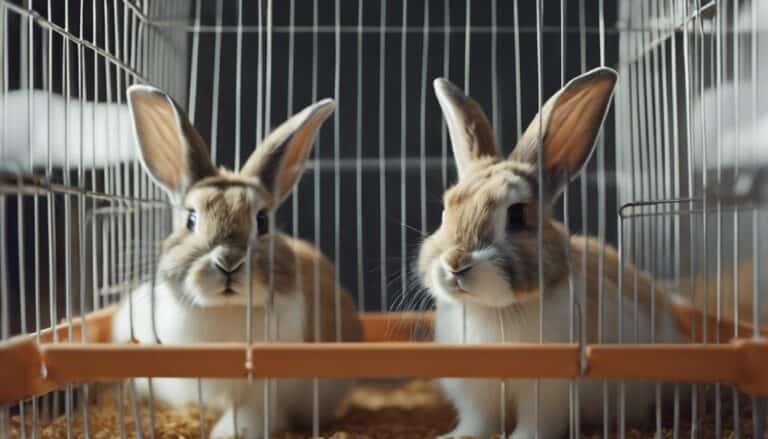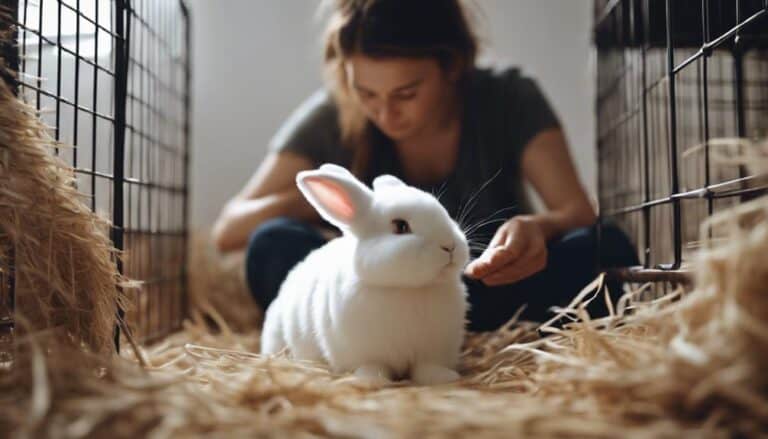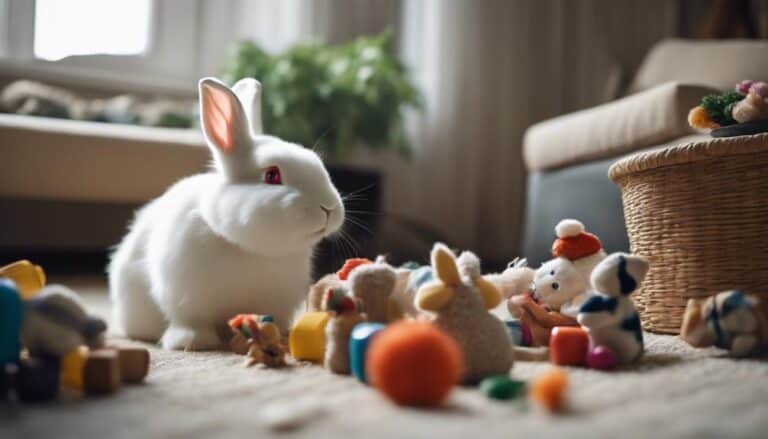You might think that bunnies, with their meticulous grooming habits, are safe from fleas. However, these pesky parasites can indeed find their way onto your adorable fluffy friend.
Understanding how bunnies can get fleas is important, as it can impact their health and well-being.
So, let's explore the factors that contribute to flea infestations in rabbits and what you can do to protect your beloved pet from these tiny troublemakers.
Contents
- 1 Key Takeaways
- 2 Causes of Fleas in Rabbits
- 3 Signs of Flea Infestation in Bunnies
- 4 Flea Treatment Options for Rabbits
- 5 Safe Flea Treatments for Bunnies
- 6 Preventing Fleas in Pet Rabbits
- 7 Risks of Fleas on Bunnies
- 8 Fleas: Rabbit to Human Transmission
- 9 Frequently Asked Questions
- 10 If My Bunny Imprints, Does That Increase the Risk of Fleas?
- 11 Conclusion
Key Takeaways
- Fleas can infest bunnies through outdoor exposure or contact with other infested animals.
- Prompt treatment with vet-recommended medications like Advantage or Revolution is crucial.
- Regular grooming and flea prevention are essential to maintain bunny health.
- Untreated flea infestations can lead to anemia, skin issues, and potential disease transmission in bunnies.
Causes of Fleas in Rabbits
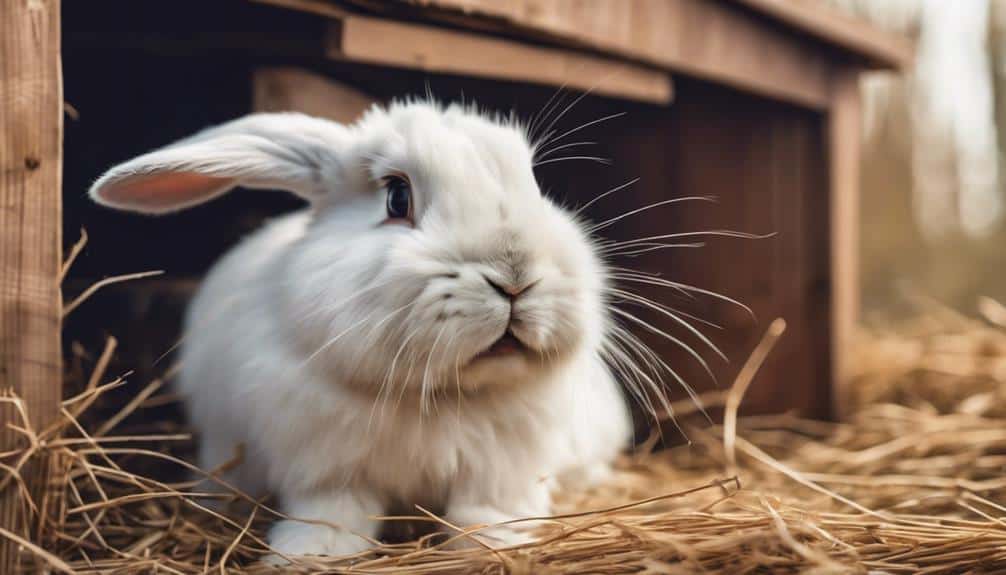
Fleas in rabbits often stem from outdoor exposure or contact with infested animals. While outdoor rabbits are more at risk, even indoor rabbits can get fleas if brought in by humans or other pets.
These tiny parasites can cause skin irritation, leading to itching and potentially more severe health issues in rabbits. Remember that rabbits living with infested dogs or cats face a higher likelihood of flea infestation due to the close proximity to the infested animals.
Additionally, fleas can also transmit diseases like the myxomatosis virus to rabbits, highlighting the significance of prevention measures. To safeguard your rabbits from these potential health risks, it's essential to implement preventive strategies and regularly check for fleas, especially if they've been in contact with infested animals or have spent time outdoors.
Signs of Flea Infestation in Bunnies
If your bunny is constantly scratching, biting, or showing signs of skin irritation, it could be indicative of a flea infestation. Look out for small black specks on your bunny's fur, known as flea dirt, as it's a common sign of fleas.
Anemia from blood loss and red bite marks on the skin are also potential indicators of a flea problem in your bunny.
Bunny Flea Symptoms
Bunny flea symptoms manifest through noticeable signs of discomfort and irritation, such as incessant itching, biting, or scratching caused by flea bites. When inspecting your rabbit, you may find red bite marks or sores on its skin, indicating flea activity.
Another tell-tale sign is the presence of flea dirt, small black specks resembling grains of sand, on the rabbit's fur. If left untreated, severe flea infestations can lead to anemia in bunnies. Additionally, fleas can transmit harmful diseases like the myxomatosis virus to rabbits, underscoring the importance of addressing flea infestations promptly.
Keeping a close eye on your bunny's behavior and physical appearance can help you detect and address flea issues early on to guarantee your pet's well-being.
Treating Bunny Fleas
When noticing signs of flea infestation in your bunny, such as itching, scratching, or the presence of flea dirt, prompt treatment with safe medications recommended by a veterinarian is essential for your pet's well-being. To effectively rid your bunny of fleas, consult with a vet for safe medication options such as Advantage or Revolution. These treatments are specifically formulated for rabbits and can help eliminate the infestation without harming your pet. Below is a table highlighting some key points to take into account when treating your bunny for fleas:
| Treatment Options | Benefits |
|---|---|
| Advantage | Effective against fleas and larvae |
| Revolution | Provides protection against various parasites |
Preventing Flea Infestation
To prevent flea infestation in your bunny, staying vigilant for signs of infestation such as itching, flea dirt, or visible live fleas is important. Fleas can transmit serious diseases like Myxomatosis and Rabbit Hemorrhagic Disease to bunnies, making prevention vital.
Regular grooming and flea prevention measures are key in keeping your bunny flea-free. Make sure your bunny's living environment is clean and free from potential flea habitats. If you suspect a flea infestation, immediate treatment is necessary to prevent further complications.
Consult your veterinarian for appropriate flea treatment options to safeguard your bunny's health. By being proactive and observant, you can help protect your furry friend from the discomfort and health risks associated with flea infestations.
Flea Treatment Options for Rabbits
For effective flea treatment options for rabbits, consult a veterinarian experienced with rabbits for safe and appropriate recommendations. When dealing with flea infestations on rabbits, it is important to use safe topical medications like Revolution or Advantage specifically designed for rabbits to guarantee their well-being. These treatments not only help in eliminating existing fleas but also prevent reinfestation for a certain period, safeguarding your furry friend from further discomfort. Consulting a vet before applying any flea treatment is essential as using the wrong products can harm your rabbit. Consistent application of these topical medications, as advised by the veterinarian, coupled with proper environmental management practices, such as regular cleaning of living spaces and bedding, is key to maintaining a flea-free environment for your rabbits. Below is a table summarizing some safe and effective flea treatment options for rabbits:
| Treatment | Description |
|---|---|
| Revolution | Topical medication effective against fleas and mites |
| Advantage | Monthly topical flea treatment for rabbits |
Safe Flea Treatments for Bunnies
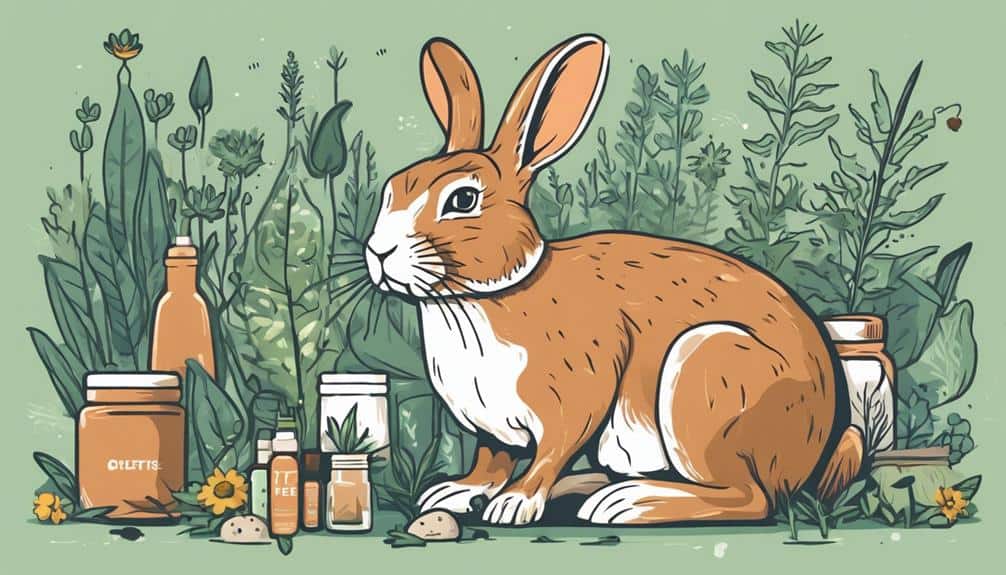
To safeguard the well-being of your bunnies, it's important to carefully select safe and effective flea treatments recommended by veterinarians. When it comes to flea control for your furry companions, here are some essential points to contemplate:
- Revolution and Advantage: These are safe and veterinarian-recommended flea treatments for bunnies.
- Proper Dosing: Given the weight variations among bunnies, ensuring the correct dosage is vital for the effectiveness and safety of the treatment.
- Prevent Reinfestation: Flea treatments like Revolution can eliminate fleas at all life stages and provide protection against reinfestation for 2-4 weeks.
- Consult Your Vet: Before administering any flea treatment to your bunnies, especially young or elderly rabbits, it's important to consult with a veterinarian for guidance on the appropriate product and dosage.
Preventing Fleas in Pet Rabbits
Prevent flea infestations in your pet rabbits by implementing effective preventative measures and maintaining good hygiene practices. Keeping your pet rabbits indoors is a great way to reduce the risk of flea infestations.
Regularly using vet-recommended preventative treatments can provide additional protection. Good hygiene practices, such as cleaning rabbit bedding and living areas, can help prevent the transmission of fleas.
Consider annual home flea treatments to create a flea-free environment for your pet rabbits. Diatomaceous earth, a natural substance, can also be utilized as a preventative measure against fleas in pet rabbits.
Risks of Fleas on Bunnies
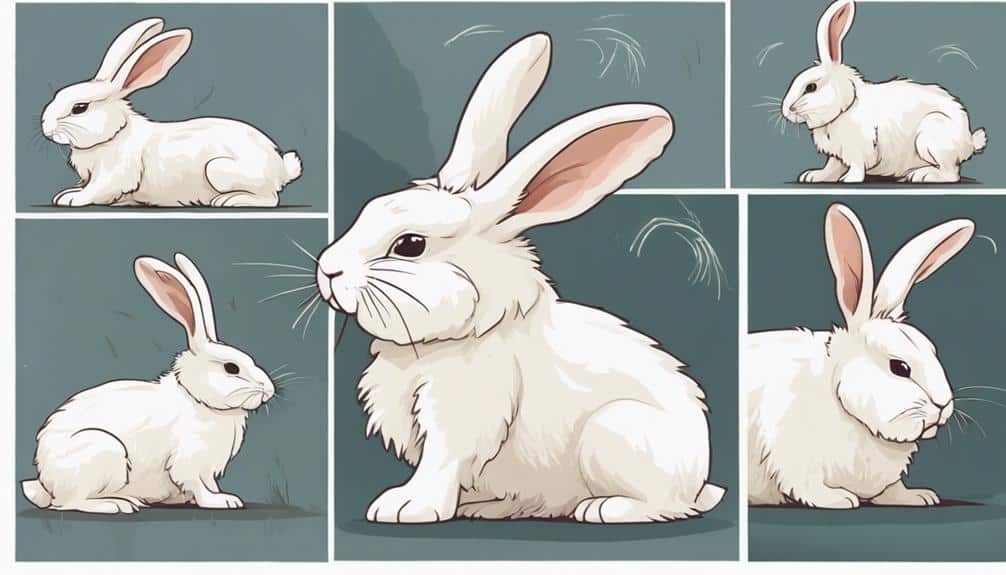
Having fleas on your bunny poses significant health risks, including itching, skin irritation, anemia, and potential transmission of fatal diseases like myxomatosis virus.
To safeguard your bunny's well-being, it's essential to prioritize flea prevention and promptly treat any signs of flea infestations to prevent further complications.
Flea Health Concerns
Fleas pose significant health risks to bunnies, potentially leading to anemia, skin issues, and the transmission of fatal viruses. When fleas infest your rabbit, they can cause:
- Anemia, especially in severe infestations.
- Hair loss, scaling, and skin irritation.
- Transmission of fatal viruses like Myxomatosis and Rabbit Hemorrhagic Disease.
- Infections and skin problems due to the presence of fleas.
For your bunny's health, it's important to address flea infestations promptly to prevent complications such as anemia and skin infections. Regular monitoring and immediate treatment are essential to safeguard your bunny from the detrimental effects of fleas.
Bunny Flea Prevention
To safeguard your bunny from the risks associated with fleas, regular monitoring and immediate treatment are essential important preventive measures. Bunnies can get fleas from various sources like outdoor exposure, contact with infested pets, or other animals carrying fleas.
Fleas on bunnies can lead to itching, skin irritation, and potential transmission of diseases such as the myxomatosis virus. Preventing flea infestations in bunnies involves administering regular flea treatments to all household pets. If left untreated, fleas on bunnies can cause anemia, hair loss, and skin issues.
Keeping your bunnies indoors, maintaining a clean environment, and using vet-prescribed flea treatments are important steps in preventing your rabbit from suffering the effects of flea infestations from contact with infested pets.
Treating Bunny Fleas
Regular monitoring and prompt treatment of bunny fleas are essential in safeguarding your rabbit's health and well-being. When dealing with flea infestations on bunnies, it's important to take immediate action to prevent potential risks such as flea bites, skin irritation, and the transmission of diseases. Here are some key points to keep in mind when treating bunny fleas:
- Use a flea comb regularly to remove adult fleas and flea eggs from your bunny's fur.
- Consult with a veterinarian to choose safe and effective flea medications like Advantage or Revolution.
- Implement a grooming routine to help control flea populations on your bunny.
- Be vigilant about environmental cleaning and preventive measures to avoid flea reinfestation.
Fleas: Rabbit to Human Transmission
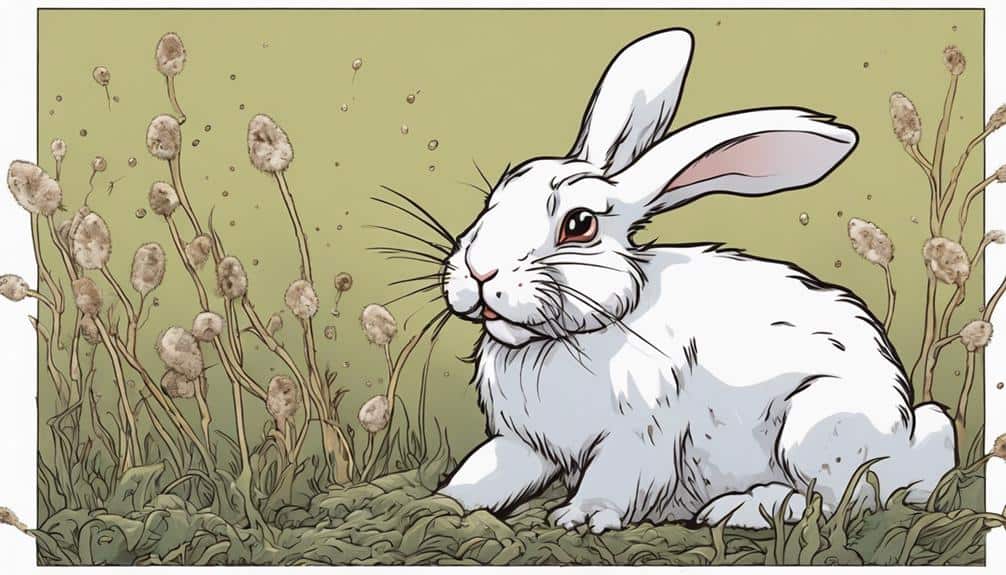
Transmitting from rabbits to humans through direct contact or shared living spaces, the transfer of fleas can lead to itchy red marks on your skin from bites, underscoring the importance of thorough treatment for both rabbits and their environment. Fleas from rabbits can carry diseases that pose risks to humans, making prevention essential.
If your rabbit has fleas, there's a potential for these parasites to jump onto you, causing discomfort and potential health issues. Prompt treatment of both your rabbit and the surroundings is critical to avoid the spread of fleas. Ensuring proper hygiene practices and using appropriate flea control measures for your rabbits can help minimize the risk of transmission.
Frequently Asked Questions
How Do I Know if My Bunny Has Fleas?
To know if your bunny has fleas, check for flea dirt and signs of itching. Use a flea comb to find live fleas or eggs. Look for red bite marks. Regular health checks help prevent severe infestations.
How Do I Get Rid of Fleas on My Rabbit?
To rid your rabbit of fleas, use rabbit-safe flea treatments, groom with a flea comb, clean their living area, and monitor for reinfestation. Keep your bunny healthy with these steps to confirm proper flea control and hygiene.
Can Humans Get Fleas From Rabbits?
You can't get fleas directly from rabbits. Fleas prefer specific hosts and don't usually survive on humans. Human flea infestations are commonly from pets like dogs and cats. Keep good pet hygiene for flea prevention.
Do Rabbits Carry Fleas and Ticks?
To keep bunnies free from pests like fleas and ticks, prioritize flea prevention, tick removal, regular rabbit grooming, and flea treatment. This helps maintain bunny health, control parasites, and prevent flea transmission, ensuring peak rabbit hygiene.
If My Bunny Imprints, Does That Increase the Risk of Fleas?
If my bunny imprints, does that increase the risk of fleas? Bunnies imprinting behavior, where they form strong attachments, can increase the risk of fleas as they may spend more time in close contact with other animals. Regular flea prevention measures should be taken to ensure the bunny’s health and comfort.
Conclusion
To sum up, bunnies can indeed get fleas, so it's important to be vigilant in preventing and treating infestations.
By recognizing the causes, signs, and treatment options for flea infestations in rabbits, you can guarantee the well-being of your furry friend.
Remember, an ounce of prevention is worth a pound of cure – so stay proactive in keeping your bunny flea-free and healthy.


